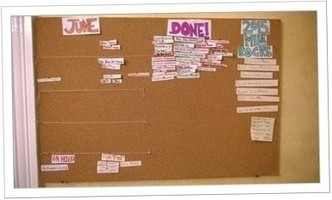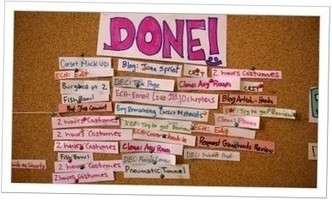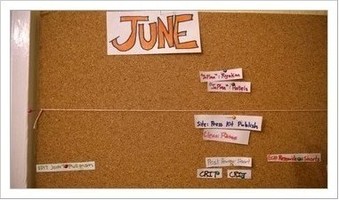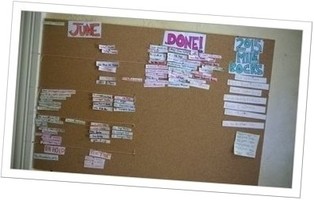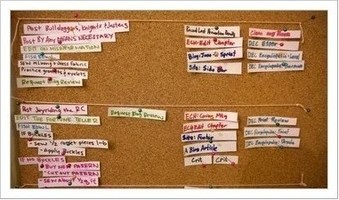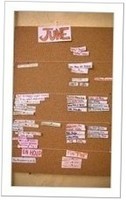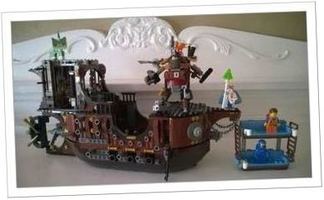Sprint 6b: How Did 2 Week Writing Goals Go?
 June 15, 2015
by
David T. Allen
June 15, 2015
by
David T. Allen
Since we just moved to a two-week period for setting goals, I wanted to do a quick check-in.
“I love deadlines. I love the whooshing noise they make as they go by.” - Douglas Adams
Retrospective
Benefits of Planning 2 Weeks
Leslie liked the change, and thinks setting two-week goals helps create more accurate plans. She said:
More accurately estimating how much I can get done is better for productivity. If I still have 6 things on my list on a Saturday, I’m more likely to think, “Eh, there’s no way I’ll polish all this off,” and be less dedicate to getting stuff done.
If I’m very close to completing all of my goals, though, I’m more likely to push to complete them all, even if it’s a lot of effort.
I saw similar benefits. I wanted to derail my sprint to improve the web site. But, knowing we’d create a new sprint plan on Sunday kept me focus on the original tasks, because it wouldn’t be long before I could officially put “web site” on the board.
We’re most excited to accomplish our first week’s goals because they’re fresh. There hasn’t been enough time for our priorities to change drastically. Also, the “done” column is empty, which is a huge motivation. Pushing tickets over gets the sprint off to a good start.
We also want to end the sprint well, which gives us an extra push the last week.
I also think we won’t feel buried in work this next two weeks. The new tasks can be less aggressive since we’re taking into consideration all the things we haven’t accomplished yet. Removing tasks from the board when we were on a four week cadence felt less honest.
Finally, some of our tasks require both of us to finish them. For instance, when Leslie finishes writing a chapter, I need to give one strong pass on edits before we share it with our writing community. In the past, I was too focused on other immediate things. This led to one of two results:
-
The tasks didn’t move to done, even though Leslie finished her part. That doesn’t feel awesome, and can add unnecessary stress.
- Tasks at the end of the month that relied on my work (eg “post chapter to writing community”) couldn’t be started. Tasks that rely on other tasks become difficult to manage.
Now that I’m taking a break from actively promoting Dream Eater’s Carnival, I can get back to editing one chapter a week. Knowing that I’ve already edited three chapters, Leslie can make posting those chapters for feedback a realistic goal.
How Did We Do?
Leslie finished all but one goal, which was an incredible feat.
I had some scope creep my first week, but that’s because I knew I wasn’t going to finish planning our trip to Japan but I still wanted to finish the same amount of tasks.
I missed a lot in week two, but that’s because submitting a print edition of Dream Eater’s Carnival took longer than expected. I was able to finish it at the last minute and, since a print edition is one of our 2015 milestones, I can still feel great about how much I accomplished.
We also took most of a Saturday to put brick down in our front yard. Doing so means we have to mow less, which also means we’ll save time in the future.
Mindset
I still would like to try keeping the cork board about what we accomplish in a month instead of what we accomplish in a sprint. We’re going to leave the past sprint’s tasks, finished and unfinished, on the board. I’m treating this more as a check-in point, but we might start clearing the board every two weeks to take advantage of the motivation from an empty done column.
Since I didn’t finish all of my tasks, I want to give special priority to the unfinished tasks. If I move them into the current week, then I have no visual indication of how overdue they are.
If we find leaving our finished tasks on the board makes us complacent, we’ll change to clearing the board after every sprint. After all, moving things into an empty “done” column feels really good.
Takeaways
-
Avoid writing tasks that rely on other tasks. They adds confusion and are harder to finish. If it takes two people to finish, then make two tasks.
-
Reassess your goals and process often. Getting on a two week cadence gives us more opportunities to reflect on what’s working and what isn’t. We can also make changes faster and see the results.
-
Consider your definition of done. When is a task truly finished? What level of quality are you aiming for? How much effort will it take? If it’s really hard, try to break it into smaller tasks. If you’re goal is to make something that’s polished, consider creating intermediary steps.
- Create goals that can be finished on a weeknight. This is especially important for me, since I work a fairly demanding job at a startup. Having five tasks moved to “done” before Saturday changes the breathing-in-a-paper-bag I need to get things done stress into let’s see if we can clear the board motivation.
New Goals
The next two weeks are going to be tough. We have a big launch at work, which will likely take an entire Saturday and a few of my weeknights. There’s also Father’s Day and my parents’ 40th anniversary. All of these are great things, but it means our success is limited to what we can accomplish on weekdays.
I tried to break my tasks down to what can be finished after work. Hopefully I can finish some stragglers from the beginning of June:
I’ve been trying to update our “encyclopedia” ever since we published Dream Eater’s Carnival. The encyclopedia is a binder of characters, settings, mechanics, etc. We use it to catalog what we want to do and what has already been done. Any time we mention a character, we consult the encyclopedia to ensure specific details are consistent with previous chapters. The problem is, I’ve had one task that just said update encyclopedia for many weeks now. So, I broke it down into four smaller pieces to get it started.
I want to finish working on a print edition of Dream Eater’s Carnival. I recently submitted a formatted copy and am waiting for a proof. Once I’ve verified the final product looks good, we can add it to the market.
I still have a lot to do for our Japan trip, which I consider a book goal since travel will inspire our second full-length novel. I also kept cleaning as a goal, since having a clean space helps us focus. It also forces me to go through old slips of paper that have random ideas scrawled on them.
Leslie will try to post three new chapters to our writing community. She’ll continue to edit one first-draft chapter a week.
Her week 4 is a little strange, since there’s an if-else scenario. She wants to continue working on her costume for the upcoming Big River Steampunk Festival in Missouri, but the parts she ordered are coming from far away and have unreliable shipping dates. So, her fourth week will be defined by whether she gets the parts in time or not.
Metal Beard’s Sea Cow
We started the pirate ship from The Lego Movie. Here’s as far as we got; we’ve been too busy to finish.
